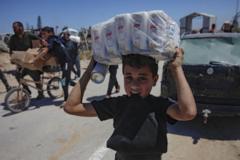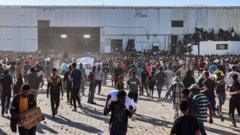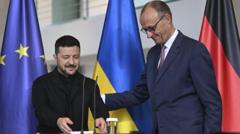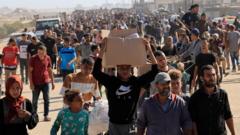The European Union has raised strong objections to the Israeli military strikes in Gaza, emphasizing that they have exceeded what is necessary in the fight against Hamas. EU's foreign affairs chief Kaja Kallas stated that such actions are causing an unacceptable toll on civilians as the number of casualties in Gaza rises significantly. She noted that the EU does not endorse a new U.S. and Israeli-backed aid distribution model that evades standard humanitarian organizations like the United Nations.
EU Criticizes Israeli Military Actions in Gaza as Excessive and Inhumane

EU Criticizes Israeli Military Actions in Gaza as Excessive and Inhumane
Top EU diplomat expresses concern over humanitarian impact and aid distribution issues amidst ongoing conflict.
As Israeli airstrikes continue, resulting in the deaths of at least 3,924 people, according to the Hamas-run health ministry, the EU is voicing concern over the lack of effective humanitarian aid reaching those in need. Kallas criticized the ongoing Israeli blockade, which has severely limited the flow of assistance into Gaza since the military campaign resumed in March. She emphasized that the EU is one of the primary sources of humanitarian aid, yet most of it fails to reach the affected population due to restrictions imposed by Israeli authorities.
The situation prompted stern remarks from various international leaders, including German Chancellor Friedrich Merz, who expressed confusion over Israel’s goals amid escalating civilian casualties. The recent condemnation from the UK, France, and Canada has intensified calls for Israel to cease its military operations in Gaza. In a noteworthy development, the UK announced the suspension of trade negotiations with Israel.
As the conflict continues, there are rising concerns about the humanitarian crisis, with UN agencies warning of extreme food shortages affecting Gaza's 2.1 million residents. Additionally, the US and Israel's proposed aid system, which involves a new group, the Gaza Humanitarian Foundation (GHF), has been rejected by the UN, raising ethical and logistical dilemmas.
Amidst these tensions, Israeli Prime Minister Benjamin Netanyahu reiterated his plans for the relocation of Gaza's population, a notion that has drawn widespread criticism and is seen by many as a method of forced expulsion. With the situation in Gaza reaching catastrophic levels since the onset of this military conflict following Hamas's cross-border attack in October, the EU is poised to reassess its trade relations with Israel in response to these developments, further aggravating an already strained diplomatic relationship.
The situation prompted stern remarks from various international leaders, including German Chancellor Friedrich Merz, who expressed confusion over Israel’s goals amid escalating civilian casualties. The recent condemnation from the UK, France, and Canada has intensified calls for Israel to cease its military operations in Gaza. In a noteworthy development, the UK announced the suspension of trade negotiations with Israel.
As the conflict continues, there are rising concerns about the humanitarian crisis, with UN agencies warning of extreme food shortages affecting Gaza's 2.1 million residents. Additionally, the US and Israel's proposed aid system, which involves a new group, the Gaza Humanitarian Foundation (GHF), has been rejected by the UN, raising ethical and logistical dilemmas.
Amidst these tensions, Israeli Prime Minister Benjamin Netanyahu reiterated his plans for the relocation of Gaza's population, a notion that has drawn widespread criticism and is seen by many as a method of forced expulsion. With the situation in Gaza reaching catastrophic levels since the onset of this military conflict following Hamas's cross-border attack in October, the EU is poised to reassess its trade relations with Israel in response to these developments, further aggravating an already strained diplomatic relationship.





















